By Micaela Constantini*
From Sunday October 31 until November 12, the United Nations Climate Change Conference, better known as COP26, has taken place. It is the first face-to-face summit in two years, with the participation of delegates from almost all the countries that make up the UN, a large number of heads of state and government, experts on environmental issues, business leaders, representatives of non-governmental organisations (NGOs) and the civil society in general. However, several demands have been made for the lack of inclusion of “civil society representatives to effectively participate in these critical negotiations”, as denounced by Sébastien Duyck, senior lawyer in the Climate and Energy Programme at the Center for International Environmental Law (CIEL).
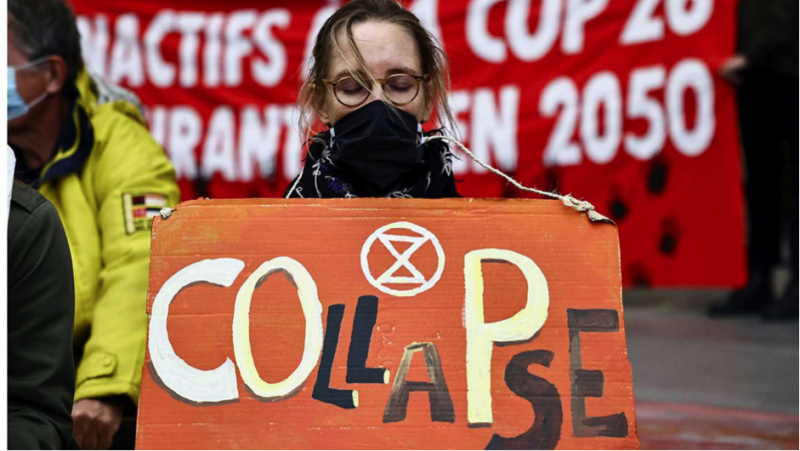
COP26 has been held every year since 1995, and is considered the supreme body where high-level representatives discuss and negotiate proposals to reduce global warming. The treaties adopted by each participating state are analysed and revised. Their main point of departue are the Kyoto Protocol (2005) and the Paris Agreement (2015). It is stipulated that the global temperature increase should not exceed 2 degrees Celsius, with a ceiling of 1.5 degrees Celsius maximum.
After 6 years of the Paris Agreement, every COP, every G20 and every commitment made by world leaders, not only has the temperature not been reduced to 1.5ºC, but the concentrations of greenhouse gases in the atmosphere have increased. This, according to the World Meteorological Organization’s (WMO) interim report on the state of the global climate in 2021, based on data for the first nine months of 2021, leads to “the last seven years on track to be the seven warmest on record”.
Why is this? Because the climate, environmental and ecological agenda debated in these spaces and international organisations does not pursue eco-social interests, environmental justice or an attempt to build a sustainable world that respects nature. Green capitalism is incoherent, it is a contradiction in contradiction, as there is no compatibility between capitalism and the care for the environment, or between capitalism and ecological sustainability.
The social climate crisis, which the entire planet has been going through, is part of the systemic crisis of decadent capitalism that manifests the unviability of a system that commodifies absolutely everything and seeks to maintain it at an unsustainable predatory level. This crisis, as PIA Global argues in the Brief Geopolitics Handbook, is a crisis of the civilisational paradigm, of capitalism as an economic and social formation.
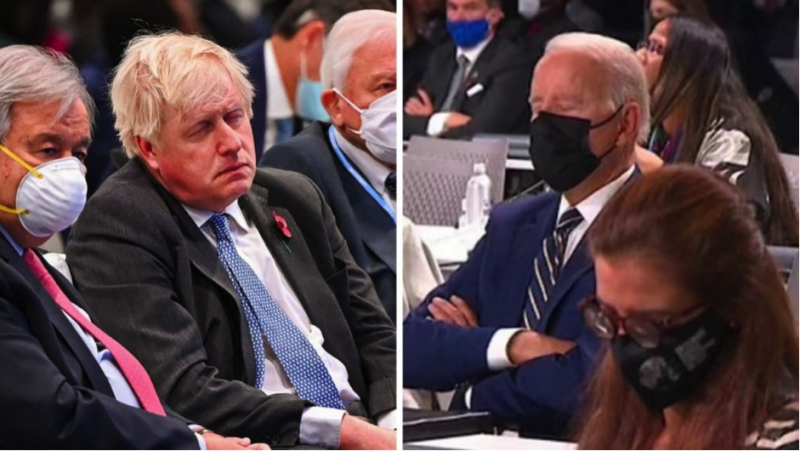
It is extremely important that the actors seeking to consolidate their discourse of ‘green capitalism’ do not impose their agenda on us. Here we will analyse some fundamental keys to understanding the incompatibility of ‘green capitalism’ and the objectives behind it.
Imperialism will never be environmental
“It is not the climate that needs to be changed, but the system” is one of the main slogans shouted from the mobilisations against the COP. And there is no doubt that this system, the capitalist system in its imperialist phase, can no longer continue to produce and consume as it has been doing, nor can it continue to place the market as the centre of human development. The problem is the system, not the climate.
“The imperialist centres, with 15% of the world’s population, hoard 85% of the world’s goods for their own consumption and waste”. (Brief Handbook of Geopolitics: Declinationism, Redeployment and Multipolarism).
It was necessary for the crisis(es) to knock on the door of the great powers in order to be included in the agenda of the main areas of discussion of the State and International Organisations, but mainly in the agenda of the market. The priority for this sector is that CO2 emissions should be sufficiently “low” to be able to continue with the current production and consumption model. The truth is that this is not possible. It is not the first time in history that we see how the process of transformation and expansion of capitalism, now imperialism, produces profound transformations in the whole of capitalist social relations that end with the misery and plunder of peoples, the loss of sovereignty, the colonisation of entire continents and with great wars or warlike confrontations.
We find ourselves in a phase of imperialist capitalism in which the social-historical conditions of production are producing the very conditions of civilisational annihilation. It is a systemic crisis, we are witnessing a ‘simultaneous and contemporary concurrence’ of crises that cross all areas of the current system: economic and financial crisis, social climate crisis, destruction of biodiversity, water and food shortages, energy crisis, institutional crisis, urban collapses, crisis of state…
Every attempt to recompose capitalism in crisis, in history, has shown us that it never manages to solve the problem, it only serves as a palliative to continue stretching its inevitable decline. The proposal of ‘green capitalism’ is one of them.
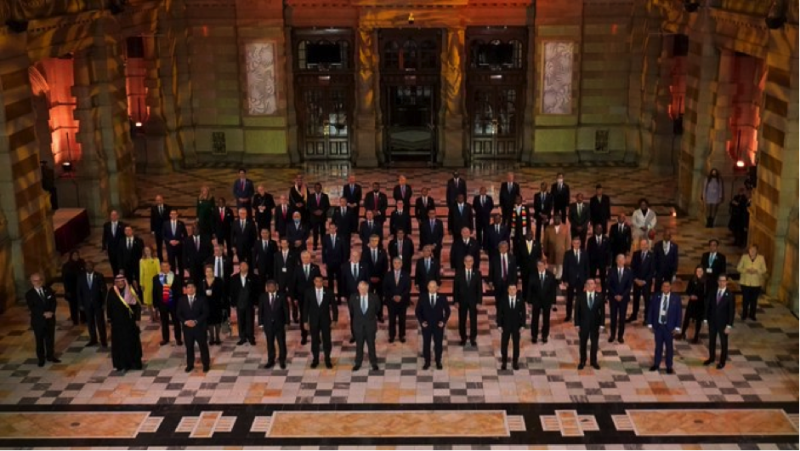
The first thing to say is that the basis of imperialist capitalism is sustained by the plunder of common goods, which they consider as exploitable resources, commodities. So we find ourselves with the over-colonisation and plunder of countless countries in the global south, such as in the African or South American continent, rich in natural resources, biodiversity and strategic metals. This is the key to thinking about the geopolitical interests of this new attempt at capitalist recomposition, based on the shift to the green market, since the logic of plundering common goods will not stop; on the contrary, the predatory extractivist industry will increase and with it the inequalities between the North and the Global South, with the peoples of the latter bearing the brunt of the negative impact.
As Wendy Moran explains for Latin America in Movement, “in general, the batteries needed to store energy require metals, such as lithium and magnesium, which are mainly present in developing countries. While the largest current producer of lithium is Australia, the largest reserves of the metal are found in Bolivia (21 million tonnes), Argentina (19.3 million tonnes), Chile (9.6 million tonnes), the United States (7.9 million tonnes), Australia (6.4 million tonnes), China (5.1 million tonnes)”.
And although the climate, ecological and social crisis is overwhelming the planet, and is on the agenda of discussions in international organisations, two thirds of global electricity is produced in thermal power plants dependent on fossil fuels, especially coal, but also gas and oil. Furthermore, it is the world’s major powers that generate the most energy from fossil fuels, and therefore emit the most pollution.
With instances such as COP26, they pretend that all countries equally comply with the ecological objectives proposed for 2030, when we clearly know that there are big differences between the countries that have more resources and tools to face the transition and those that do not. “Man” (a term used ambiguously) is then blamed for the acceleration of the social climate crisis and is asked to make an effort and commit to reversing it, while the main polluters and producers of the crisis – financial power and multinational companies – are left without responsibility and consequences.
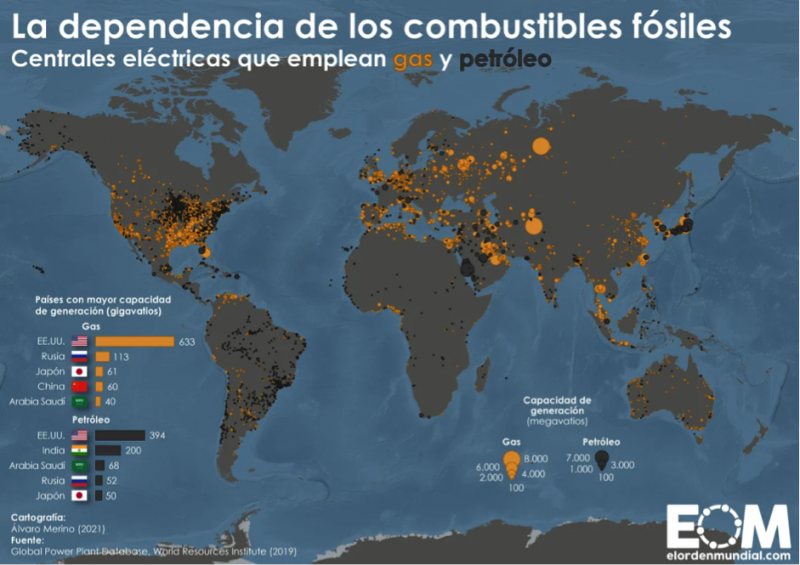
“21,238 country members, 13,834 observers, 3823 members of the press. This is the number of people registered,” says Tais Gadea Lara, who is covering COP26 from Glasgow. And this is the most symbolic and tangible representation of the contradiction raised in this section. The world leaders together with their teams and the executives of big business arrived in Glasgow (after passing through Italy for the G20) in 400 private planes and luxury cars, emitting more than ten thousand tons of carbon, and a great excess of hypocrisy.
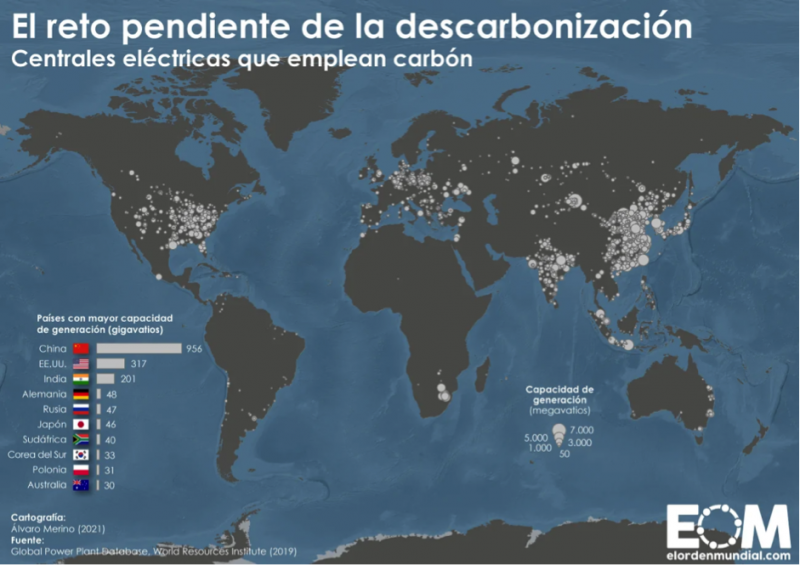
Finally, this imperialist capitalism needs a military power that allows it to hold on to that power, intervene in foreign countries and ensure plunder. Katehon’s Leonid Savin explains that the US military and the UK, host of the current COP26, are the world’s biggest polluters.
“Between 1975 and 2018, the Pentagon’s CO2 emissions totalled 1,267 million metric tons. The Pentagon’s annual emissions far exceed those of the US steel industry and the total emissions of countries such as Sweden, Denmark and Portugal. Between 2001 and 2018, emissions from overseas operations totalled 440 million metric tons. The UK military sector contributed 6.5 million tonnes of carbon dioxide equivalent to the Earth’s atmosphere in 2017-2018, the latest year for which all data is available. Of these, the report estimates that the Ministry of Defence’s (MOD) total direct greenhouse gas emissions in 2017-2018 were 3.03 million tonnes of carbon dioxide equivalent.”
Control of the green market
Economic and financial power is demanding and imposing the transition to the ‘green market’, not because it cares about the environment or the people of the world. It is a huge business with competing geopolitical interests. Not being against renewable energies or sources and the construction of a sovereign sustainable world, it is still extremely necessary to analyse what and who this transition to the ‘green market’ implies: who is going to control this market? Who are the main actors behind the business? What interests do they pursue? What construction of world order do they defend and what values do they spread? Who finances these projects? What do they get in exchange? What do they get in return?
As explained by El Templo del Futuro, green capitalism is based on two ideas: One “consists of a series of goods and production processes that would be less harmful to the environment. Recycling and greater technological efficiency would be the guiding principles of all production processes”. The other, “the market would be the instrument to repair existing environmental problems ranging from the concentration of greenhouse gases in the atmosphere to damage to ecosystems”. How would it be possible for the market to assume the role of superhero? They answer, “the market solution would be associated with the privatisation and commodification of all components of nature, thus the management of natural resources would be in private hands.” When bankers, financiers and capital monopolies want to control the ‘green’ agenda and market, let me hesitate and proceed with caution.
One of the tools developed by this market to contribute to the green transition, make money and increase financial speculation are green bonds or carbon credits. This instrument is stipulated in article 6 of the Paris Agreement and attempts to regulate the carbon market, where, as Tais explains, credits representing the capture or avoided emission of CO2 are bought and sold. He continues, “a carbon credit is equivalent to one tonne of CO2 that was removed from the atmosphere. For example, if a company plants trees it can sell that emission reduction to another company to offset its emissions. So can countries. How will it be possible to avoid speculation, political deals, blackmail, bribery and extortion, or the advantage of those who are better off, or the disadvantage of those who do not have the development to even have access to a green bond of their own accord?”
Another far from innovative instrument is financing. The ‘rich’ countries promised to provide 100 billion dollars a year to support the ‘poor’ countries in the transition process. In addition to failing to meet this objective, the criteria for distribution and control over what is done with this money are completely unequal and do not take into account the needs of the recipient countries. Tais explains that the countries that receive the funding require it to be spent on ‘adaptation’ to deal with the consequences of climate change, such as flooding, and not on reducing CO2 emissions.
Bank of America Global Research specified that $5 trillion will need to be invested over 30 years to achieve the green transition. This, says Betzabeth Aldana Vivas, is equivalent to twice the current global GDP. Who are the stakeholders in financing a green capitalist mode of production and regulation, we could roughly answer: financial globalism.
The ‘propaganda’ or media hype around decarbonisation and the growth of green energy, produces a strong disinvestment and financialisation of energy production through fossil fuels, and an increase in spot market agreements (short term contracts) that only increases the price of gas, coal and oil, and feeds financial speculation in an endless loop.
Dr. Alfredo Jalife-Rahme during his Keynote Lecture at the PT 2021 International Seminar, quotes former Bank of England Governor and UN Special Envoy for Finance and Climate Action, Mark Caney, stating that the “financial sector and private banks will force the world into the carbon neutral ‘green economy’ by redirecting the financial system to feed the notoriously speculative green bubble, to the detriment of investments in the productive economy”.
Another very interesting point that Jalife-Rahme addresses is the use by the US and the UK of climate change as a publicity/media weapon against China and Russia. US enmity towards China and Russia is nothing new. The West calls for the acceleration of decarbonisation (although they are one of the main producers of energy from coal) by pointing the finger at China with the aim of demonising and boycotting Chinese trade and productive growth, especially the New Silk Road. The same happens against Russia when they accuse it of the European energy crisis, try (unsuccessfully) to stop the construction of the Nord Stream II gas pipeline or seek confrontation in the Arctic (Russia’s storehouse of the richest resources, such as coal).
It’s no coincidence that the three allies in the recent AUKUS pact are the ones leading the anti-China propaganda using China’s coal production as an argument, and at a time when these same three allies are also at the top of the coal blacklist: the US is the world’s third largest coal producer, Britain has returned to coal-fired power plants and Australia is the world’s largest coal exporter and producer. The AUKUS project does not end in the Pacific waters, but is accompanied by the media strategy of demonising China as part of the strategic shift to the Indo-Pacific. Media power has historically accompanied wars as another weapon, with the aim of legitimising military interventions.
When we think about COP26, let us not forget that we are facing a device, in the form of international diplomacy, which aims to maintain a productive regulation that sustains the unsustainable, imperialist capitalism, now in its green version. It is yet another move within the chessboard of global geopolitics in which only financial and economic power (and the Western powers leading these spaces) move their pieces. The crises will continue to deepen as long as the search for a solution continues within the same system that generates them, with tools that feed each crisis, that pursue market values and do not prioritise, in the words of the Bolivarian Alliance of the Peoples of Our America (ALBA), the “defence of sovereignty for the sustainable development of the nations and peoples of the world”.
*Micaela Constantini is a journalist and member of the PIA Global research team researching cyber-geopolitics and virtuality, She is a feminist, anti-imperialist and an autodidact working with social networks, video editing and digital communication.
This article was first published in Spanish on noticiaspia.com







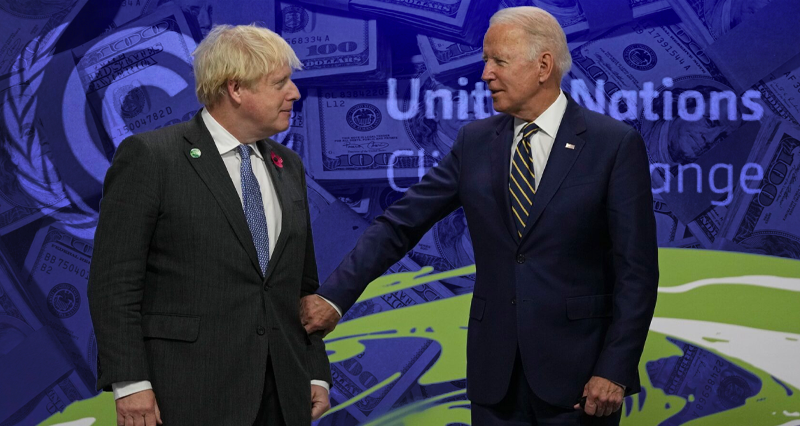

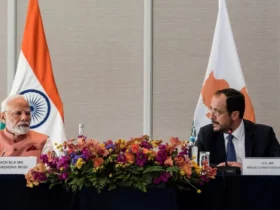
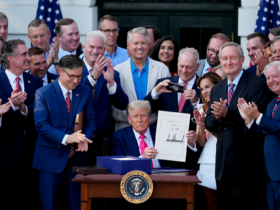


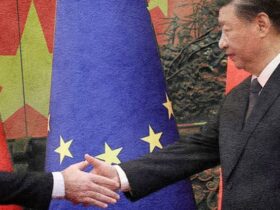

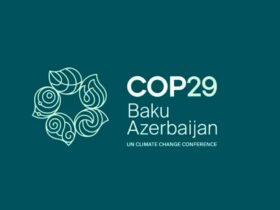

Leave a Reply